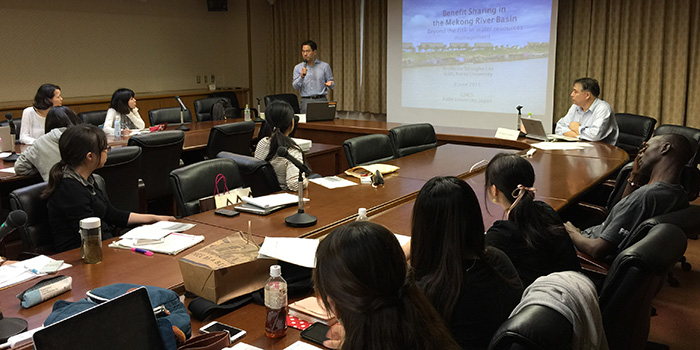Internship at FHI360 in the United States (Yaqiong WANG)
During six weeks from February 5th to March 18th 2016, I conducted an internship at FHI 360 in Washington D.C.. During the internship, I was attached to the department of...
Graduate School of International Cooperation Studies (GSICS), Kobe University


In June 9th, 2015, a seminar on development management policy focusing on “Benefit Sharing in the Mekong River Basin” was held in the Graduate School of International Cooperation Studies (GSICS) at Kobe University. Professor Seungho Lee from the Graduate School of International Study at Korea University was invited to deliver a lecture on this topic. As a doctor of geography graduate from the University of London, Professor Lee provided us very in-depth presentation with insightful analysis of the relationship between and among the riparian countries of the River.
The seminar was chaired by Professor Keiichi Ogawa from GSICS, Kobe University and attended by 32 graduate students and researchers from Kobe University. The participated students were from different countries, including riparian countries of the Mekong River. The wide cross-section of participants made for a very lively and engaging discussion regarding the topic of the seminar.
In his lecture, Professor Lee gave an overview of the geography and geopolitical issues of the riparian countries of the Mekong River, including China (upstream), Myanmar, Lao PDR, Thailand, Vietnam and Cambodia (downstream). Among them, China and Lao PDR are paying more economic interest in the river basin because of their bigger shares of the river area and benefits. More importantly, Professor Lee helped the students to understand what benefit sharing in the Mekong river basin mean and how it is in practice.
Professoer Lee went on to give a review of hydropower development along the river with a number of hydropower dam projects by the member countries. Among them, the plan by LAO PDR to have 100 hydropower dams in operation by 2025 attracted the most attention and curiosity of the participants.
Throughout the seminar, the key message that Professor Lee conveyed was that although Mekong River Basin is usually considered as a hotspot of conflicts, it is also a source for regional cooperation. His concluding remarks show positive attitudes and gradual acceptance of cooperation between China and the downstream nations in benefit sharing from hydropower to other economic interests. According to Professor Lee, the change in attitude by China and other member countries is a good signal for sustainable water management in the Mekong River Basin.
After his presentation, Professor Lee fielded questions from the seminar participants and given the large attendance by students from the Mekong River member countries, the question and answer session was full of passion and a willingness to learn and share the latest socio-economic opportunities and challenges in the context of Mekong River.
Authored by Nguyen Thi Thanh Huyen
Doctoral Student
Related Link
http://www.kobe-u.ac.jp/en/NEWS/event/2015_06_09_01.html